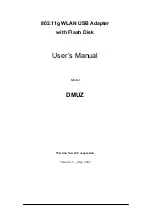
2
Regulatory Information
Federal Communication commission interference Statement
This equipment has been tested and found to comply with the limits for a
Class B digital device, pursuant to Part 15 of the FCC Rules. These limits are
designed to provide reasonable protection against harmful interference in a
residential installation. This equipment generates, uses and can radiate radio
frequency energy and, if not installed and used in accordance with the
instructions, may cause harmful interference to radio communications.
However, there is no guarantee that interference will not occur in a particular
installation. If this equipment does cause harmful interference to radio or
television reception, which can be determined by turning the equipment off
and on, the use is encouraged to try to correct the interference by one of the
following measures:
??
Reorient or relocate the receiving antenna.
??
Increase the separation between the equipment and receiver.
??
Connect the equipment into an outlet on a circuit different form that to
which the receiver is connected.
??
Consult the dealer or an experienced radio/TV technician for help.
FCC Caution: To assure continued compliance, (example-use only shielded
interface cables when connecting to computer or peripheral devices) any
changes or modifications not expressly approved by the party responsible for
compliance could void the user’s authority to operate this equipment.
This device complies with Part 15 of the FCC Rules. Operation is subject to
the following two conditions:
(1) This device many not cause harmful interference, and
(2) This device may accept any interference received, including interference
that may cause undesired operation.



































